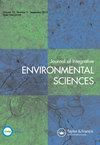气候变化下的咖啡供应链规划
IF 3.5
4区 环境科学与生态学
Q3 ENVIRONMENTAL SCIENCES
Journal of Integrative Environmental Sciences
Pub Date : 2022-07-29
DOI:10.1080/1943815X.2022.2103570
引用次数: 0
摘要
不断增长的需求和不确定的供应使得咖啡行业的可持续性成为咖啡供应链上所有参与者共同关注的问题。本研究提出了一个由种植管理(包括遮荫管理和年度农业管理)和供应链物流组成的决策模型。提出了一个两阶段的随机程序,并在滚动水平方案中使用,该方案定期更新输入数据信息,以处理与未来气候情景相关的不确定性。该计划将整个阿拉比卡咖啡供应链的总预期成本降至最低。该研究将该模型应用于美国市场阿拉比卡咖啡豆供应的实际案例研究,试图回答阿拉比卡咖啡供应是否能满足美国2022年至2050年的需求,以及如何通过企业与农民的合作关系最好地缓解短缺。结果表明,未来咖啡供应将出现3%的短缺;中等水平的遮荫管理和更多的灌溉和施肥是可能的缓解策略。这些结果表明,所有参与者都需要采用合适的技术,共同实现全球咖啡供应链的可持续性。本文章由计算机程序翻译,如有差异,请以英文原文为准。
Coffee supply chain planning under climate change
ABSTRACT The growing demand but uncertain supply makes the sustainability of the coffee industry a shared concern for all participants along the coffee supply chain. This study proposed a decision-making model that comprises the cultivation management, including shade management and annual agriculture management, and the supply chain logistics. A two-stage stochastic program is presented and used within a rolling horizon scheme that periodically updates input data information to deal with uncertainty associated with future climate scenarios. The program minimizes the total expected cost of the entire supply chain of arabica coffee. The study applied the model to the real case study of arabica coffee bean supply to the U.S. market, trying to answer whether arabica coffee supply can meet the U.S. demand from 2022 to 2050 and how to best mitigate any shortage through corporate-farmer partnerships. The results show that the coffee supply will have a 3% shortage in the future; medium-level shade management and more irrigation and fertilization are possible mitigation strategies. These results demonstrate the need for all participants to adopt suitable technologies for the sustainability of global coffee supply chains together.
求助全文
通过发布文献求助,成功后即可免费获取论文全文。
去求助
来源期刊

Journal of Integrative Environmental Sciences
ENVIRONMENTAL SCIENCES-
CiteScore
3.90
自引率
0.00%
发文量
13
审稿时长
>12 weeks
期刊介绍:
Journal of Integrative Environmental Sciences (JIES) provides a stimulating, informative and critical forum for intellectual debate on significant environmental issues. It brings together perspectives from a wide range of disciplines and methodologies in both the social and natural sciences in an effort to develop integrative knowledge about the processes responsible for environmental change. The Journal is especially concerned with the relationships between science, society and policy and one of its key aims is to advance understanding of the theory and practice of sustainable development.
 求助内容:
求助内容: 应助结果提醒方式:
应助结果提醒方式:


